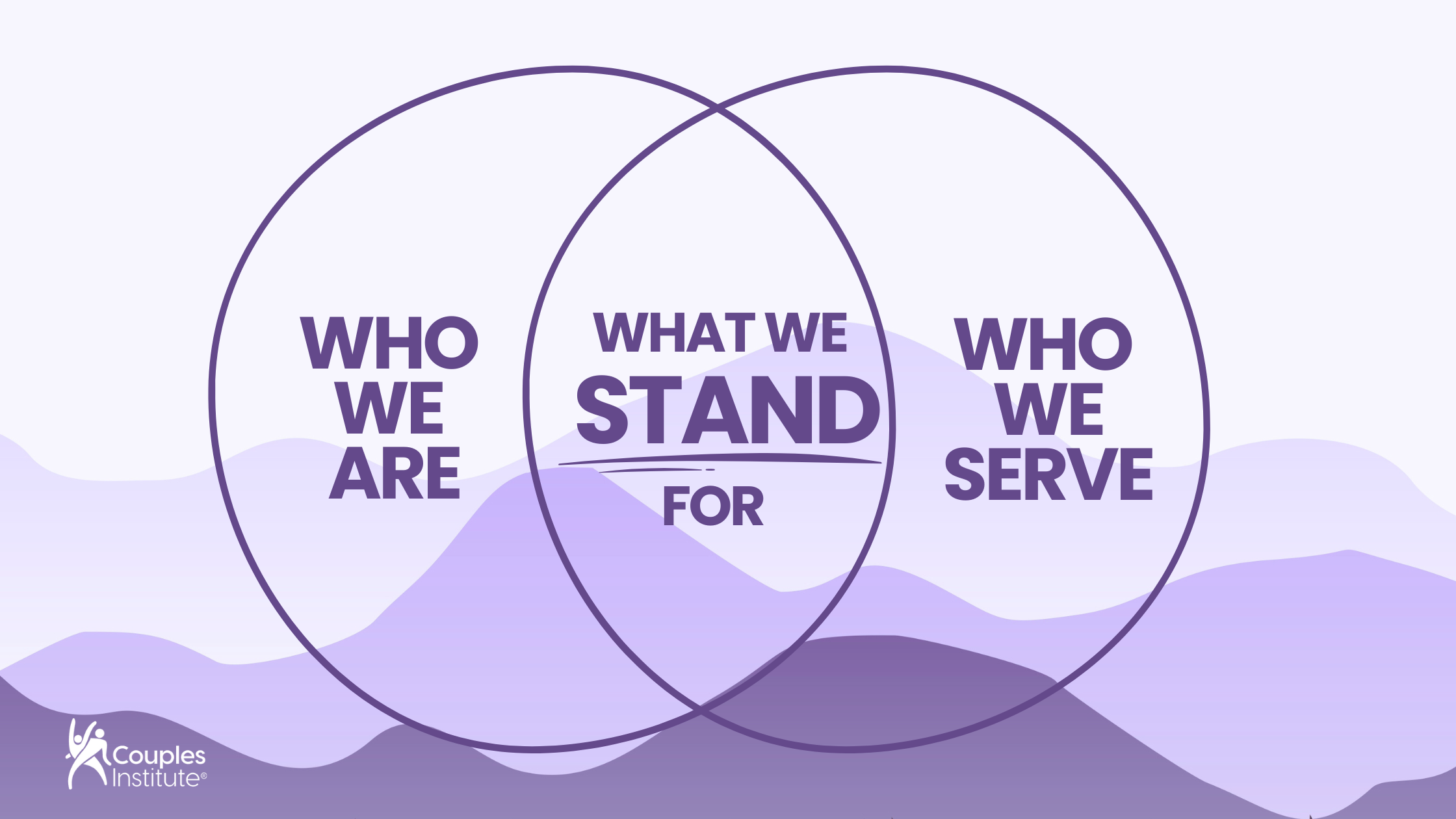
What We Stand For at The Couples Institute® If you read one thing from us this year, let this be it
As we look into the New Year, I want to share with you very clearly what Couples Institute stands for, now and always. Most of

Many therapists dread working with couples where one partner is extremely passive or passive-aggressive. Passive-aggressive partners create a lot of confusion. Commitments are regularly broken, and criticism and passivity dominate the couple’s interactions. Their spouse is usually enormously frustrated and angry. Any attempts by the couple to change the pattern fail, and increasingly the interpersonal dynamics between these partners zap the life right out of the relationship – until the life force is gone.
In fact, once a couple has interacted like this for years, they aren’t very likely to unravel the pattern themselves. And you won’t be able to unravel it with any of these common approaches:
Some of these interventions come easily and naturally to a trained therapist. There is just one problem: in an entrenched system with a chronically passive-aggressive partner, they won’t work.
These interventions help you bond with the couple. The couple will like you at first, and then the trouble will start: they will come back week after week replaying the same disappointing cycle, and any momentum you had early in therapy is now lost.
Start with the more active spouse. Working actively with this partner is one good way to build momentum. Ask the spouse to set limits on themself first. For example, “What I will do and what I won’t do.” Ask them to set these limits so that they don’t keep feeling angry. It is essential that this partner stops their unrelenting criticism and creates some discomfort in the other without raging.
Here is an example of an effective limit. The situation is that the passive-aggressive spouse agrees to clean the garage, but it never happens.
The spouse might say, “You have made commitments to clean the garage, but you don’t follow through. So, I will clean up my part this weekend. I will even help you with yours. If you don’t participate or don’t take care of your part by two weeks from now, I will hire a handyman to take the remaining mess to the dump.”
This type of limit shifts discomfort back to the partner who does not keep agreements. Then the spouse must be quiet for the two weeks and call the handyman if nothing happens.
Later explain to each of them the dilemma that exists for the passive-aggressive partner.
The passive-aggressive partner has never been supported in being direct about their passions and desires. Instead, when they were a child, they probably had repeated experiences of wanting something, getting something else instead, feeling disappointed and then being shamed for feeling disappointed.
For example, a boy raised by a single father wanted his father to be at home when he came home from school. Instead his father told him to go to the neighbor’s house. His son felt sad about never having a parent at home. His father said, “You are a baby and a sissy. A 10-year old boy should be able to fend for himself.”
As adults, these partners do not allow themselves to want and desire openly. Essentially their attachment desires go underground. Directly wanting is not safe for these partners. Instead of expressing their own wants and desires, they will thwart their partner’s wishes.
Directly expressing a differentiated desire will create enormous anxiety. This is necessary anxiety for growth and development. It is what is needed, although rarely what is wanted.
When you help the passive or passive-aggressive spouse understand the dilemma of their situation and you help the other spouse set clear guidelines and limits so they don’t live with so much uncertainty, you give both partners a way to change their immobilizing pattern. You also give them a sense that you understand them and will be able to help them.
"*" indicates required fields
 We respect your privacy.
We respect your privacy.
"*" indicates required fields
 We respect your privacy.
We respect your privacy.
As we look into the New Year, I want to share with you very clearly what Couples Institute stands for, now and always. Most of

My passion for educating couples early in their committed relationships was initially driven by personal experience. When I married at 22, my husband and I

When therapists ask me which tool has had the biggest impact on couples around the world, the answer is always the same: the Initiator–Inquirer (I-I)
This happens to be the biggest problem in my own marriage.
I also work with couples and families and am always interested at learning more effective ways to help them.
Thanks for your blogs.
Would there not first be acknowledgement of and empathy for the triggering wounds of the passive aggressive partner and insight oriented work to get him to grieve for what he never got? Otherwise, what about this being an empathy failure? The truth is, with one of my couples like this (she is avoiding and he is very passive aggressive) she ‘pulled out” after giving birth and I am doing this work with him alone.
I’m sorry but I’m afraid they feed on empathy. I was in a very long marriage, empathising and supporting but it’s just a delaying tactic on his part to avoid taking any responsibility. When I stopped doing that (and I stopped being so angry at the lack of support), I put actions similar to Ellyn’s in place and he then became VERY angry himself and very nasty. I believe that PA are just using their partner to act out their own suppressed anger.
Excellent model here! “Shift the discomfort” is a great phrase for doing psycho-education with the non-passive partner, because, and i speak from my personal life as well as my professional life, a lot of times the non-passive partner gets too comfortable with being in chronic psychic distress and protest. (And as tot he point made by the reader just above my post here, yes, but i think some of the brilliance in Ellyn’s approach here is remembering that EVEN empathetic focus can be TOO much for the passive partner at first. They have to learn to having their feeling accurately reflected does not mean catastrophe.)
Talli -acknowledgement and empathy are good – but very limited if you and/or the partner seek change and growth in the passive aggressive partner.
I had to keep learning this lesson the hard way.
Thanks for writing about the passive-aggressive partner Ellyn. Sometimes, I find myself just getting frustrating not realizing I’m dealing with a passive-aggressive person! Therefore all of the items you mentioned that do NOT work I have tried and you are so right, they don’t. It felt good to see them in print and to see exactly what i’m dealing with. I like the emphasis you put on empowering the partner to set limits and follow through on them while educating the passive-aggressive partner about their ineffective ways of managing life.
Please help me. As the wife of a passive aggressive spouse who has been in psychic distress (and the blood pressure to show for it) years of marriage and individual therapy has made no change.
When I finally came out of the fog of what I was up against, I completely lost it. We separated.
However with three children at home, the oldest becoming passive Agressive himself, I wonder if it is better for the kids to try the above mentioned type
of therapy. All the marriage therapy we’ve had so far has incorporated exactly the five points listed above–except number five. I was shut down while he gained empathy for putting up with a “demanding” wife.
Meanwhile I live in a hovel that he won’t fix or allow me to fix. Among many other obstructing behavior, and this guy makes a lot of money…
And the children escape to him rather than be accountable for
chores, getting up on time, etc
If we were to work with someone with knowledge and experience of the above, could this be saved?? I’ve put in years and my main concern is for the kids.
We are in the Los Angeles area if anyone has any suggestions.
Thank you, Liz
This is a blog for therapists, but for any of those others who write in saying this is not enough or not a solution in itself — you may be right. Particularly if all you hear is that you need to set better boundaries, without any focus on the inability of the PA partner to know or express their own desires (“self-differentiation”). This latter part is likely not something most troubled couples can do on their own.
As well, therapists will understand that a passive-aggressive presentation can be real, but it is quite likely not the only thing that is affecting a troubled relationship. Some of the related difficulties that others have mentioned or hinted at here are built-up resentment, oppositional polarization, ADHD or other underfunctioning, a more severe anxious overfunctioning in the non-PA partner, complications from triangulating in other family members, other personality disorders, etc.
My humble suggestion is not to necessarily include other dark or oppositional traits as inherent to the nature of PA, or to dismiss the treatment Ellyn speaks of, but to consider other factors as well. With patience and luck and a great therapist, you may be able to make progress. However there are still no guarantees. especially for those who have already separated, where lack of motivation/leverage is going to be a greatly limiting factor.
I’ve found that this approach worked for me both
as a therapist and in my marriage. This does not
preclude empathy for each spouse. I’m eager to
learn more about including inner child work in the
couple sessions.
Great article with valuable tools! I completely agree. This strategy also allows the spouse relying on the passive aggressive one to follow through not to feel so powerless and thus, more enraged, which only adds to the vicious cycle.
When I wrote that this approach helped in my work as a therapist I was referring to making a plan of action and telling the passive aggressive partner what s/he will do if partner doesn’t take care of what needs to be done. but the interpretation of what childhood experiences may have contributed to his underground aggression was not part of my approach and I would like to incorporate it because it would make the passive aggressive partner feel understood and supported even while he will have to face realistic and fair consequences
Hi…I’ve been in a marriage for over 20 yrs. Counseling 3 to 4 times that showed a little improvement, but in the past few years. I finally figure out this pass two years …my husband is a passive aggressive behavior problems. One thing I have been asking him and arguing with him for 10 yrs over and over with. He only drives my van a few times out of the year. He adjust my mirrors inward to show 1/4th of the side of my van. A few days later on or a week later. I get into my vehicle and take off not remembering he had drove it a few days back. I live in the city and start to merge into another lane going about 60 / 65 miles per hour. My blind side of the mirrors on both sides of my van doesn’t show that there is a car there in the lane. Then all of a sudden I have the other car honking at me …due to I almost crashed together with them. I’m over 60 and can’t remember things like I use to. This is putting my life in danger not counting when my grandkids are with me a lot. I have expressed this to him over and over….he could kill us all by doing this. He keep on doing it! A few months ago June 2016 …my grandson caught him changing the mirrors and said, Grandma doesn’t want you to change the mirrors. Grandpa replied back to him, “If Grandma wants them moved back…then she can do it herself”.
I’m to the point feeling that he wants me dead…no matter the cost. Our relationship is not a strong one at all, but I really don’t know who to talk to about this with. We both are working on the adoption of both of our grandkids 7 & 11, and I have no family on my side in the state we live in. Only his family and friends lives here. If I told them…they would think I’m crazy and would totally not believe me. I thought about going to the police, but that would open up a can of worms and a case file. I just need to ask someone if they have….
Any suggestion?
Stop him driving your van. Sorry, but they love to wind you up and he has no intention of changing.
This is not a solution for the nonpassive partner, just more work. The PA person is relieved to not have to do the chore and feels no discomfort so nothing has been gained. The discomfort is for the nonpassive spouse who has to wait two weeks, not say anything, and then pay for a handyman.
The passive aggressive person is not avoiding the chore solely because he doesn’t want to do it; he is avoiding the chore to upset his partner. By her refusing to end up with the chore undone (the key here is that she is refusing to be unhappy), the discomfort ultimately lands on the passive partner. He failed at the chore AND at making his partner unhappy. She was able to get what she wanted without his participation. That’s the message they need to hear loud and clear.
I never thought that part of the PA’s motivation is to upset the partner. Wow! That makes sense actually because they don’t seem to like other people to tell them what to do, so it’s a way of “getting back” at the non PA partner while avoiding conflict. They seem is a strong urge for autonomy that never was developed in childhood, so they are trying to obtain it with their partner, not realizing they are sabotaging the healthy interdependence of the relationship because they NEED to assert independence. Their refusal to follow through seems to be a rebellious protective behavior to maintain autonomy. Many PA’s seem to have autonomy developmental issues. Most likely their self differentiated autonomy was never acknowledged or encouraged and was most likely actively discouraged through shame or guilt, so it never developed because it wasn’t allowed. So they have to go underground to get this VERY REAL need for autonomy met. As the Non PA in my relationship, this understanding is starting to help me try to encourage and support my PA partner’s autonomy as much as possible, while at the same time asserting myself. I am trying to set boundaries for myself when it comes to criticism and rage. A very tall order and difficult to do, but I am making baby steps. I totally appreciate this article and discussion. I’m not a therapist, but love these resources.
Agree with SRC! And waste money and time on couples therapy!
So succinct and SO helpful. Thank you
I see this in therapy all the time. Neither of them get what they want, so they stop trying and live as financial partners without any intimacy.
In my case, the passive-aggressive couple is one of the most complicated to work with. I usually differentiate between listening and speaking and I try not to interrupt each other so that they can listen to each other until the end. That is, I interview one member in the presence of the other, without them looking at each other, something like: it’s about you but not about you, and in this way a different conversational space is opened that they can replicate at home. I find the idea of making commitments and setting limits more dynamic and disturbing (moving). I think it is necessary to create a safe, respectful space to express oneself.
Thank you for the insight on dealing with the passive-aggressive for the non-passive aggressive which enable them to set toleration levels for themselves while reducing their anger.
I had an ex-partner like this, we will talk about what I want and come up with plans he agrees to follow through. But he simply cannot do it, and he blames it on his ADHD. There is some truth to it, ADHD makes it harder. But the core of the issue is his inability to express his desires and his resentment that I can.”It feels unfair to him when he does not know how to get what he wants in the relationship while I am better at it.” So it makes sense for him to frustrate me and I give up eventually. There is also this “you cannot make me” oppositional defiant part that is very prevalent for ADHD clients.
I make this type of intervention frequently. The non-passive-aggressive partner refuses to follow through on the limits thinking they will pay too big a price in being retaliated against. Thoughts on how to best empower spouse to follow through on the limit?